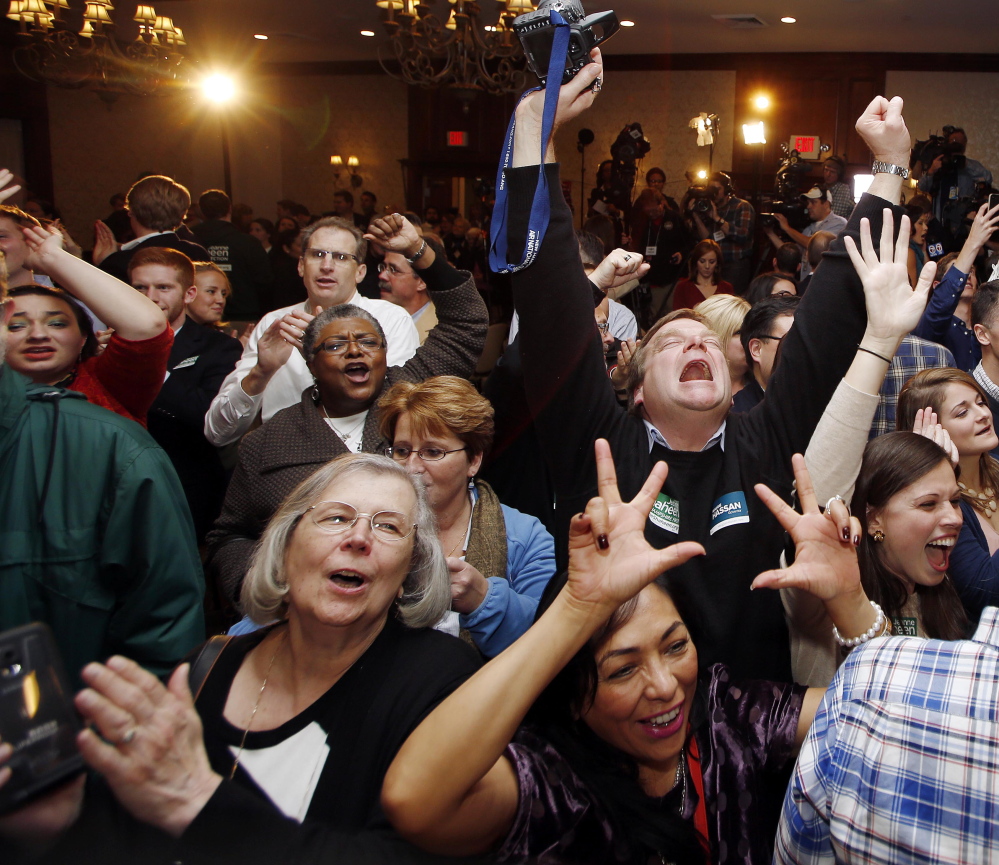CONCORD, N.H. — When Republicans won supermajorities in both of New Hampshire’s legislative chambers in 2010, they erased previous Democratic gains that led some to believe the state was trending to the left. And Democrats knew they couldn’t let their guard down again.
“Election night 2010 became my obsession,” Democratic party chairman Ray Buckley said.
Those lessons learned were clear in 2014, as Democrats started early to build a massive voter turnout operation that, in part, helped the party withstand a movement that won Republicans governorships nationwide and control of the U.S. Senate.
Gov. Maggie Hassan, U.S. Sen. Jeanne Shaheen and U.S. Rep. Annie Kuster all won for the Democrats, but success at the top of the ticket didn’t translate down the ballot. Republicans won back one congressional seat, and gained control of the Legislature and the executive council.
Both parties are already turning their attention to the next election, each with something to learn from this one.
Shaheen’s 2008 win gave New Hampshire Democrats their first U.S. Senate seat since the 1970s, but the party has held a strong grip on the governor’s seat since 1996 with only one two-year term being held by a Republican.
The GOP, however, has had more continuous luck in the Legislature. In the past 20 years, the party has only been in the minority in both chambers from 2006 to 2010.
With control of both chambers and the council, Republicans can do more to halt Hassan’s agenda than they could during her first term. Still, they don’t have the supermajorities that made veto overrides possible during former Democratic Gov. John Lynch’s final term.
“While it would have been great to also run the corner office, the truth is we have the governor surrounded now,” Republican party chairwoman Jennifer Horn said.
The state’s Democratic Party is widely considered to have a stronger party organization and ground operation that brings voters to the polls. Outside groups such as Planned Parenthood, NextGen Climate and the firefighters union also contributed greatly to the party’s get-out-the-vote effort. The Republican Party, however, did run its largest ground game ever this election cycle, Horn said, making more than 1 million individual voter contacts.
There are several reasons why Democrats’ efforts may not helped local lawmakers. Redistricting in 2010 created a map that makes it harder for Democrats to control the legislature while Hassan and Shaheen didn’t win by large enough margins to carry lower-ticket candidates without name recognition to a victory.
“When our top of the ticket is held to numbers in the low 50s, it doesn’t provide for the coattails that historically Democrats need to have success further on down,” Buckley said.
Horn and Buckley say New Hampshire is still in safe swing territory, even as the electorate may have been trending Democratic in recent years. Looking ahead to 2016, Republicans must keep searching for a way to win at the top of ticket, while Democrats will see if their recent string of success allows them to knock out Republican U.S. Sen. Kelly Ayotte.
“Looking ahead to 2016, I would put the state right where it was – it’s Democratic leaning,” said Dante Scala, associate professor of political science at the University of New Hampshire.
“It doesn’t mean that it’s impossible for a Republican to win statewide.”
Copy the Story LinkSend questions/comments to the editors.



Success. Please wait for the page to reload. If the page does not reload within 5 seconds, please refresh the page.
Enter your email and password to access comments.
Hi, to comment on stories you must . This profile is in addition to your subscription and website login.
Already have a commenting profile? .
Invalid username/password.
Please check your email to confirm and complete your registration.
Only subscribers are eligible to post comments. Please subscribe or login first for digital access. Here’s why.
Use the form below to reset your password. When you've submitted your account email, we will send an email with a reset code.